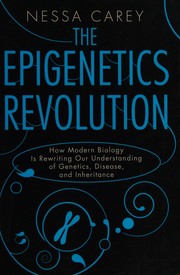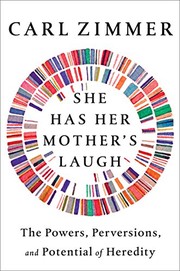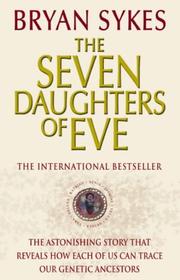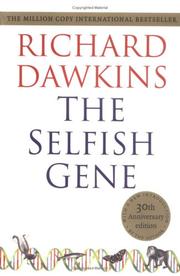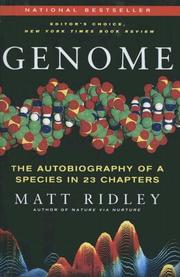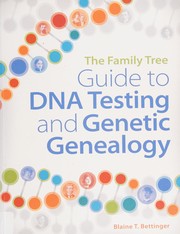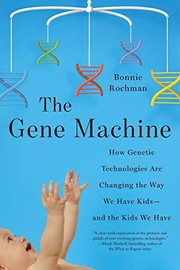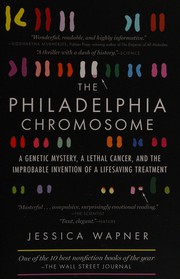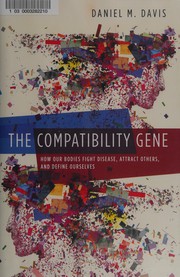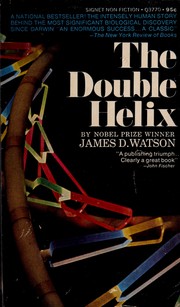Are you fascinated by the intricate world of genetics? Whether you’re a science enthusiast, a student, or simply someone curious about the mysteries of DNA, these 20 best books about genetics will satisfy your thirst for knowledge. From groundbreaking discoveries to ethical debates, each book on genetics offers a unique perspective on the subject, making them essential reads for anyone keen on understanding the complexities of our genetic makeup. Join us as we explore the most compelling genetics books that shed light on the code of life and its profound implications.
Contents
- 1 20 Best Genetics Books
- 2 The Gene: An Intimate History
- 3 The Epigenetics Revolution: How Modern Biology Is Rewriting Our Understanding of Genetics, Disease, and Inheritance
- 4 She Has Her Mother’s Laugh: The Powers, Perversions, and Potential of Heredity
- 5 The Language of Life: DNA and the Revolution in Personalized Medicine
- 6 The Violinist’s Thumb: And Other Lost Tales of Love, War, and Genius, as Written by Our Genetic Code
- 7 The Seven Daughters of Eve: The Science That Reveals Our Genetic Ancestry
- 8 The Immortal Life of Henrietta Lacks
- 9 The Selfish Gene
- 10 Genome: The Autobiography of a Species in 23 Chapters
- 11 The Family Tree Guide to DNA Testing and Genetic Genealogy
- 12 The Gene Machine: How Genetic Technologies Are Changing the Way We Have Kids—and the Kids We Have
- 13 The Philadelphia Chromosome: A Genetic Mystery, a Lethal Cancer, and the Improbable Invention of a Lifesaving Treatment
- 14 The Red Queen: Sex and the Evolution of Human Nature
- 15 The Invisible History of the Human Race: How DNA and History Shape Our Identities and Our Futures
- 16 The Compatibility Gene: How Our Bodies Fight Disease, Attract Others, and Define Our Selves
- 17 The Tangled Tree: A Radical New History of Life
- 18 The Double Helix: A Personal Account of the Discovery of the Structure of DNA
- 19 The Emperor of All Maladies: A Biography of Cancer
- 20 The Epigenetics Revolution: How Modern Biology is Rewriting Our Understanding of Genetics, Disease, and Inheritance
- 21 The Philosopher’s Dog: Friendships with Animals
- 22 Final Thoughts on Best Genetics Books
- 23
20 Best Genetics Books
The Gene: An Intimate History
by Siddhartha Mukherjee
The Gene: An Intimate History by Siddhartha Mukherjee is a captivating exploration of the fascinating world of genetics. This groundbreaking book delves into the history, science, and impact of genetics on human life. Mukherjee takes readers on a journey through the complexities of heredity, from the discovery of the gene to the latest breakthroughs in genetic research. With compelling storytelling and meticulous research, he unravels the profound implications of genetics on our understanding of identity, illness, and evolution.
Through vivid anecdotes and personal narratives, The Gene offers a profound and thought-provoking perspective on the profound impact that genetics has had on humanity. Mukherjee’s eloquent prose and deep insight make this book a must-read for anyone curious about the inner workings of the human body and the intricate mechanisms of heredity. Whether you are a science enthusiast or simply intrigued by the mysteries of life, The Gene is a captivating and enlightening journey into the world of genetics.
The Epigenetics Revolution: How Modern Biology Is Rewriting Our Understanding of Genetics, Disease, and Inheritance
by Nessa Carey
The Epigenetics Revolution is a fascinating book on genetics that delves into the field of epigenetics, the study of changes in gene expression that do not involve alterations to the genetic code itself. Author Nessa Carey takes readers on a journey through the latest discoveries in this rapidly evolving field, explaining how epigenetics is reshaping our understanding of genetics, disease, and inheritance.
Through engaging storytelling and clear explanations, Carey unpacks complex scientific concepts and introduces readers to groundbreaking research that is transforming our knowledge of how genes are regulated and inherited. She also explores the potential implications of epigenetics for human health, including its role in diseases such as cancer, diabetes, and mental illness.
This genetics book provides an accessible and thought-provoking exploration of a cutting-edge scientific field, making it a must-read for anyone interested in the latest developments in biology and genetics.
She Has Her Mother’s Laugh: The Powers, Perversions, and Potential of Heredity
by Carl Zimmer
She Has Her Mother’s Laugh: The Powers, Perversions, and Potential of Heredity by Carl Zimmer is a captivating exploration of the complex and fascinating world of genetic inheritance. In this thought-provoking book on genetics, Zimmer delves into the history of heredity, from the earliest discoveries to the latest breakthroughs in genetic science. He examines the ways in which genes shape our lives, from physical traits to behaviors, and the implications of this knowledge for society.
Zimmer also delves into the ethical and societal implications of genetic research, raising important questions about the potential for misuse and the impact of genetic knowledge on our understanding of identity and individuality. With his engaging and accessible writing style, Zimmer takes readers on a journey through the wonders and complexities of heredity, weaving together personal stories, scientific research, and historical anecdotes to create a compelling and thought-provoking genetics book. She Has Her Mother’s Laugh is a must-read for anyone interested in the science of inheritance and its profound impact on humanity.
The Language of Life: DNA and the Revolution in Personalized Medicine
by Francis S. Collins
The Language of Life: DNA and the Revolution in Personalized Medicine by Francis S. Collins is a groundbreaking book about genetics that delves into the incredible potential of personalized medicine. Dr. Collins, a renowned geneticist and the director of the National Institutes of Health, takes readers on a journey through the fascinating world of genomics, exploring how our understanding of DNA is revolutionizing the way we approach healthcare.
Collins reveals how advances in genetics are leading to more targeted and effective treatments, as well as the potential for predicting and preventing diseases based on an individual’s genetic makeup. Through engaging storytelling and clear explanations, he demonstrates the power of genomics to transform the future of medicine and improve patient outcomes.
Whether you’re a healthcare professional, a student of biology, or simply interested in the cutting-edge field of genetics, this genetics book offers a compelling and accessible look at the ways in which our understanding of DNA is reshaping the way we approach healthcare.
The Violinist’s Thumb: And Other Lost Tales of Love, War, and Genius, as Written by Our Genetic Code
by Sam Kean
The Violinist’s Thumb: And Other Lost Tales of Love, War, and Genius, as Written by Our Genetic Code is a captivating exploration of the fascinating world of genetics. Written by Sam Kean, this book delves into the stories hidden within our genetic makeup, exploring the incredible tales of love, war, and genius that are encoded within our DNA.
Through a series of captivating anecdotes and real-life examples, Kean takes readers on a journey through the history of genetics, uncovering the incredible discoveries and breakthroughs that have shaped our understanding of the genetic code. From the story of a violinist with an extraordinary genetic mutation to the tales of love and war that are etched into our genes, this book offers a unique and engaging perspective on the mysteries of our genetic heritage.
Whether you’re a science enthusiast or simply curious about the secrets hidden within our DNA, The Violinist’s Thumb is a must-read for anyone interested in the intricate and captivating world of genetics. This genetics book will leave you with a newfound appreciation for the incredible stories that are woven into the fabric of our genetic code.
The Seven Daughters of Eve: The Science That Reveals Our Genetic Ancestry
by Bryan Sykes
The Seven Daughters of Eve: The Science That Reveals Our Genetic Ancestry by Bryan Sykes is a captivating book about genetics that takes readers on a journey through time to uncover the origins of humanity. Sykes, a renowned geneticist, uses cutting-edge DNA research to trace the maternal lineage of modern humans back to seven ancient women, whom he named the “Seven Daughters of Eve.”
Through engaging storytelling and accessible science, Sykes introduces readers to the world of genetics, exploring the genetic markers that connect us to these ancestral women and shedding light on the history of human migration and evolution. He presents a fascinating blend of scientific discovery, historical insight, and personal anecdotes, making complex genetic concepts relatable and engaging for all readers.
Whether you’re a science enthusiast or simply curious about your own genetic ancestry, The Seven Daughters of Eve offers a compelling and accessible exploration of the human story written in our DNA.
The Immortal Life of Henrietta Lacks
by Rebecca Skloot
The Immortal Life of Henrietta Lacks by Rebecca Skloot is a captivating non-fiction book about the remarkable story of a woman whose cells, known as HeLa cells, revolutionized the field of medicine. Henrietta Lacks, a poor African American woman, unknowingly contributed to scientific research when her cells were taken without her consent in the 1950s. Skloot delves into the ethical and moral implications of this groundbreaking discovery, as well as the impact it had on Henrietta’s family.
This genetics book explores the intersection of science, ethics, and race, shedding light on the exploitation of Henrietta’s cells and the profound consequences it had on medical advancements. Skloot weaves together the personal story of Henrietta’s life and the scientific breakthroughs that resulted from her cells, creating a compelling narrative that is both informative and thought-provoking. The Immortal Life of Henrietta Lacks is a powerful and important book that highlights the complexities of medical research and the enduring legacy of one woman’s cells.
The Selfish Gene
by Richard Dawkins
The Selfish Gene by Richard Dawkins is a groundbreaking book on genetics that challenges the traditional view of evolution. Dawkins introduces the concept of the gene as a selfish entity that drives the process of natural selection. He argues that genes are the ultimate controllers of our behavior and that they manipulate us to ensure their own survival and replication. With engaging and thought-provoking examples, Dawkins explains how this ‘selfish gene’ perspective can shed light on various aspects of human and animal behavior, from altruism to aggression. The book provides a fascinating insight into the underlying mechanisms of evolution and offers a new perspective on the role of genes in shaping the natural world. It’s a must-read for anyone interested in understanding the fundamental principles of evolution and the forces that drive genetic change. Dawkins’ clear and captivating writing style makes this genetics book an accessible and enlightening read for both scientists and non-scientists alike.
Genome: The Autobiography of a Species in 23 Chapters
by Matt Ridley
Genome: The Autobiography of a Species in 23 Chapters by Matt Ridley is a groundbreaking book on genetics that takes readers on a fascinating journey through the human genome. Ridley explores the 23 pairs of chromosomes that make up our genetic blueprint, delving into the history, science, and implications of our genetic code.
This genetics book is not just a dry scientific tome; Ridley’s engaging writing style brings the complexities of genetics to life, making it accessible to readers of all backgrounds. Each chapter focuses on a different aspect of our genetic makeup, from the genetic basis of behavior and personality to the role of genes in human evolution.
Through captivating storytelling and insightful analysis, Ridley sheds light on the profound impact of our genes on our lives, and the ways in which our understanding of genetics is shaping the future of medicine, society, and even our own sense of identity. Genome is a must-read for anyone curious about the inner workings of the human body and the incredible story of our genetic heritage.
The Family Tree Guide to DNA Testing and Genetic Genealogy
by Blaine T. Bettinger
The Family Tree Guide to DNA Testing and Genetic Genealogy by Blaine T. Bettinger is a comprehensive and accessible book on genetics. It offers a detailed overview of how genetic testing can be used to explore one’s family history and uncover hidden connections. Bettinger, a renowned genetic genealogist, provides clear explanations of the science behind DNA testing and how it can be applied to genealogy research.
Readers will find practical advice on choosing the right test, interpreting the results, and using online tools to further their research. With real-life case studies and examples, this book about genetics brings the subject to life, making it an invaluable resource for both beginners and experienced genealogists.
Whether you’re just starting to explore your family tree or looking to delve deeper into your genetic heritage, The Family Tree Guide to DNA Testing and Genetic Genealogy is a must-read genetics book that will help you navigate the fascinating intersection of DNA and genealogy.
The Gene Machine: How Genetic Technologies Are Changing the Way We Have Kids—and the Kids We Have
by Bonnie Rochman
The Gene Machine: How Genetic Technologies Are Changing the Way We Have Kids—and the Kids We Have by Bonnie Rochman is a fascinating exploration of the ethical, social, and personal implications of genetic technologies. Rochman delves into the world of reproductive genetics, discussing topics such as pre-implantation genetic diagnosis, gene editing, and the increasing ability to screen for genetic disorders. Through compelling stories and in-depth research, Rochman raises thought-provoking questions about the potential consequences of these technologies, from the impact on individuals and families to the broader implications for society as a whole. This genetics book also examines the complexities of decision-making when it comes to using genetic technologies to have children, and the ethical dilemmas that arise from these advancements. The Gene Machine is a compelling and timely exploration of the ways in which genetic technologies are reshaping the very fabric of human existence.
The Philadelphia Chromosome: A Genetic Mystery, a Lethal Cancer, and the Improbable Invention of a Lifesaving Treatment
by Jessica Wapner
The Philadelphia Chromosome: A Genetic Mystery, a Lethal Cancer, and the Improbable Invention of a Lifesaving Treatment by Jessica Wapner is a captivating book on genetics that delves into the intriguing story of the discovery of the Philadelphia chromosome and its connection to a deadly form of leukemia. Wapner skillfully weaves together the scientific and human elements of this groundbreaking discovery, taking readers on a journey through the complexities of genetics, cancer, and medical innovation.
Through meticulous research and compelling storytelling, Wapner sheds light on the collaborative efforts of scientists, researchers, and patients that led to the development of a groundbreaking treatment for chronic myeloid leukemia. The book offers a fascinating glimpse into the world of genetics, providing readers with a deeper understanding of the role of genetic mutations in disease and the potential for targeted therapies.
The Philadelphia Chromosome is a must-read for anyone interested in the intersection of science, medicine, and human perseverance, making it a truly captivating genetics book that will leave readers both informed and inspired.
The Red Queen: Sex and the Evolution of Human Nature
by Matt Ridley
The Red Queen: Sex and the Evolution of Human Nature by Matt Ridley is a captivating book about genetics that explores the intricate relationship between sex and evolution. Ridley delves into the concept of sexual selection and the role it plays in shaping human behavior and biology. Drawing on the latest research in evolutionary psychology, biology, and anthropology, he presents a compelling argument for the influence of sexual competition on our genetic makeup.
Through engaging storytelling and thought-provoking analysis, Ridley uncovers the evolutionary arms race between organisms, referred to as the “Red Queen” hypothesis. He discusses how this ongoing struggle for survival and reproduction has driven the development of human traits and behaviors, from physical characteristics to social interactions.
With its accessible language and fascinating insights, The Red Queen provides readers with a deeper understanding of the forces at play in human nature and the book on genetics that have shaped our species. Whether you’re a science enthusiast or simply curious about the mysteries of human evolution, this genetics book is sure to captivate and enlighten.
The Invisible History of the Human Race: How DNA and History Shape Our Identities and Our Futures
by Christine Kenneally
The Invisible History of the Human Race by Christine Kenneally is a fascinating book about genetics that explores how DNA and history intersect to shape our identities and futures. Kenneally delves into the ways in which our genetic heritage influences everything from our physical appearance to our predisposition for certain diseases, and how this knowledge can inform our understanding of who we are and where we come from.
Through a captivating blend of science, history, and personal stories, Kenneally examines the impact of genetics on individuals and communities, as well as the ethical implications of genetic research and technology. She also highlights the role of genetic genealogy in uncovering the hidden connections between different populations and the ways in which these revelations can challenge our assumptions about race, ancestry, and identity.
Whether you’re a science enthusiast or simply curious about the origins of humanity, The Invisible History of the Human Race offers a thought-provoking journey into the complex and often surprising ways in which genetics shape our lives.
The Compatibility Gene: How Our Bodies Fight Disease, Attract Others, and Define Our Selves
by Daniel M. Davis
The Compatibility Gene: How Our Bodies Fight Disease, Attract Others, and Define Our Selves by Daniel M. Davis is a fascinating book on genetics that delves into the intricate world of our immune system and its role in shaping our lives. Davis, a renowned immunologist, explores the concept of the major histocompatibility complex (MHC), also known as the compatibility gene, and its influence on our health, attraction to others, and even our sense of self.
Through engaging storytelling and cutting-edge scientific research, Davis reveals how the MHC plays a crucial role in our ability to fight off diseases, as well as in our personal relationships and even our individual identity. This thought-provoking book about genetics offers a fresh perspective on the impact of our genes and immune system on various aspects of our lives, challenging readers to reconsider the way they perceive their own bodies and interactions with others.
Whether you have a background in genetics or are simply curious about the science behind human compatibility, The Compatibility Gene is sure to captivate and enlighten you with its blend of compelling storytelling and groundbreaking research.
The Tangled Tree: A Radical New History of Life
by David Quammen
The Tangled Tree: A Radical New History of Life by David Quammen is a captivating book about genetics that delves into the interconnectedness of all living things. Quammen takes readers on a journey through the groundbreaking field of molecular biology, exploring the complex web of relationships that connect all organisms on Earth. Through engaging storytelling and rigorous scientific research, the author reveals the surprising ways in which genes can be transferred between different species, challenging traditional notions of evolution and the tree of life. The book introduces readers to the pioneering scientists who have revolutionized our understanding of the natural world, and offers a fresh perspective on the evolution of life on our planet. Whether you’re a seasoned biologist or simply curious about the mysteries of life, The Tangled Tree is a must-read for anyone fascinated by the genetics book and the interconnectedness of all living things.
The Double Helix: A Personal Account of the Discovery of the Structure of DNA
by James D. Watson
The Double Helix is a captivating book about genetics that provides a personal account of the discovery of the structure of DNA. Written by James D. Watson, one of the key scientists involved in the groundbreaking discovery, the book offers a unique and intimate perspective on the scientific breakthrough that revolutionized the field of molecular biology.
With a blend of scientific insight and personal anecdotes, Watson takes readers on a journey through the competitive and collaborative world of scientific research in the 1950s. The book provides a glimpse into the personalities, ambitions, and challenges of the scientists involved, offering a fascinating behind-the-scenes look at the pursuit of knowledge.
Full of drama, ambition, and scientific intrigue, The Double Helix is a must-read for anyone interested in the history of genetics and the human stories behind scientific discovery. It offers a compelling narrative that brings the complex world of molecular biology to life, making it a timeless classic in the field of genetics.
The Emperor of All Maladies: A Biography of Cancer
by Siddhartha Mukherjee
The Emperor of All Maladies: A Biography of Cancer by Siddhartha Mukherjee is a captivating and comprehensive exploration of the history and impact of cancer. This Pulitzer Prize-winning book delves into the origins, treatments, and societal impact of this insidious disease, providing a profound and illuminating look into the complex world of oncology.
Mukherjee weaves together personal stories, scientific breakthroughs, and historical context to create a compelling narrative that spans centuries. Through his meticulous research and engaging storytelling, he paints a vivid picture of the relentless battle against cancer, offering insights into the triumphs and tribulations of the medical community and the individuals affected by the disease.
This groundbreaking work is not just a book about genetics; it is a powerful testament to the resilience of the human spirit and the unwavering pursuit of a cure for cancer. Whether you are a medical professional, a patient, or simply curious about the history of medicine, The Emperor of All Maladies is a must-read for anyone seeking a deeper understanding of this formidable adversary.
The Epigenetics Revolution: How Modern Biology is Rewriting Our Understanding of Genetics, Disease, and Inheritance
by Nessa Carey
The Epigenetics Revolution: How Modern Biology is Rewriting Our Understanding of Genetics, Disease, and Inheritance by Nessa Carey is a groundbreaking book about the field of epigenetics, which explores how our environment and experiences can influence gene expression and inheritance. Carey’s engaging writing style and clear explanations make this complex topic accessible to a wide audience, from scientists to curious non-experts.
This genetics book delves into the fascinating world of epigenetics, discussing how our lifestyle, diet, and environmental factors can impact our genetic makeup and health. Carey also explores the implications of epigenetics for understanding and treating diseases, as well as its potential impact on future generations.
Whether you’re a biology enthusiast or simply curious about the latest advances in genetics, The Epigenetics Revolution offers a compelling and thought-provoking read that will revolutionize your understanding of inheritance and genetics.
The Philosopher’s Dog: Friendships with Animals
by Raimond Gaita
The Philosopher’s Dog: Friendships with Animals by Raimond Gaita is a captivating exploration of our relationships with animals and the profound impact they have on our lives. Gaita, a renowned philosopher, delves into the ethical and emotional complexities of our bonds with animals, drawing from personal experiences and philosophical insights to shed light on the deep connections we form with our furry companions.
Through a series of poignant and thought-provoking essays, Gaita delves into the moral and existential questions that arise from our interactions with animals, challenging readers to consider the fundamental nature of human-animal relationships. The book is a heartfelt tribute to the joy, companionship, and wisdom that animals bring into our lives, and a stirring reminder of the responsibilities we have towards them.
Whether you’re an animal lover or simply intrigued by the complex dynamics between humans and animals, The Philosopher’s Dog is a must-read. This book will leave you with a deeper appreciation for the unique bond we share with our animal friends. It’s a genetics book that will touch your heart and stimulate your mind.
Final Thoughts on Best Genetics Books
Genetics is a fascinating and complex field, and these 20 best books about genetics offer valuable insights into the science behind it. Whether you’re a student, a researcher, or simply an enthusiast, these books provide a comprehensive understanding of genetics and its impact on our world. From classic works to cutting-edge research, these books cover a wide range of topics and are sure to enrich your knowledge of genetics. Happy reading!
Which book about Genetics is best?
The best book on Genetics can vary with personal preference, but three widely recommended titles are:
- The Gene: An Intimate History by Siddhartha Mukherjee,
- The Epigenetics Revolution: How Modern Biology Is Rewriting Our Understanding of Genetics, Disease, and Inheritance by Nessa Carey,
- She Has Her Mother’s Laugh: The Powers, Perversions, and Potential of Heredity by Carl Zimmer.
Each offers valuable insights and could be a great starting point.
What are the best books to learn about Genetics?
For those looking to learn about Genetics, there is a wealth of literature that can provide a comprehensive understanding of the subject. Some of the most highly recommended books include:
- The Gene: An Intimate History by Siddhartha Mukherjee,
- The Epigenetics Revolution: How Modern Biology Is Rewriting Our Understanding of Genetics, Disease, and Inheritance by Nessa Carey,
- She Has Her Mother’s Laugh: The Powers, Perversions, and Potential of Heredity by Carl Zimmer,
- The Language of Life: DNA and the Revolution in Personalized Medicine by Francis S. Collins,
- The Violinist’s Thumb: And Other Lost Tales of Love, War, and Genius, as Written by Our Genetic Code by Sam Kean,
- The Seven Daughters of Eve: The Science That Reveals Our Genetic Ancestry by Bryan Sykes,
- The Immortal Life of Henrietta Lacks by Rebecca Skloot,
- The Selfish Gene by Richard Dawkins,
- Genome: The Autobiography of a Species in 23 Chapters by Matt Ridley,
- The Family Tree Guide to DNA Testing and Genetic Genealogy by Blaine T. Bettinger
These books offer a range of perspectives on Genetics, covering various aspects and approaches to the subject.
What are the best books about Genetics?
The best books about Genetics are:
- The Gene: An Intimate History by Siddhartha Mukherjee,
- The Epigenetics Revolution: How Modern Biology Is Rewriting Our Understanding of Genetics, Disease, and Inheritance by Nessa Carey,
- The Gene Machine: How Genetic Technologies Are Changing the Way We Have Kids—and the Kids We Have by Bonnie Rochman,
- The Philadelphia Chromosome: A Genetic Mystery, a Lethal Cancer, and the Improbable Invention of a Lifesaving Treatment by Jessica Wapner,
- The Selfish Gene by Richard Dawkins,
- The Seven Daughters of Eve: The Science That Reveals Our Genetic Ancestry by Bryan Sykes.
Each offers unique insights into the subject. While these books about Genetics are highly regarded, it’s important to note that any list of ‘best’ books is subjective and reflects a range of opinions.
What are the best Genetics books of all time?
Choosing the best Genetics books of all time can vary depending on who you ask, but five titles that are often celebrated include
- The Gene: An Intimate History by Siddhartha Mukherjee,
- The Epigenetics Revolution: How Modern Biology Is Rewriting Our Understanding of Genetics, Disease, and Inheritance by Nessa Carey,
- The Violinist’s Thumb: And Other Lost Tales of Love, War, and Genius, as Written by Our Genetic Code by Sam Kean,
- The Selfish Gene by Richard Dawkins,
- and The Gene Machine: How Genetic Technologies Are Changing the Way We Have Kids—and the Kids We Have by Bonnie Rochman.
Each of these books has made a significant impact in the field of Genetics and continues to be influential today.


